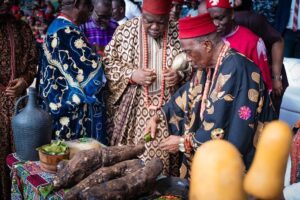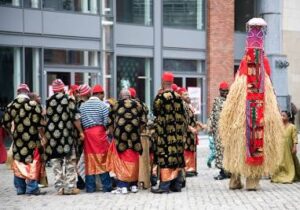The Igbo New Yam Festival, known in the Igbo language as Iri Ji Ohuru or Iwa Ji, is one of the most important traditional celebrations in Igbo culture. This festival marks the end of the farming season and the beginning of harvest, serving as both a spiritual and communal event. It goes beyond the consumption of yam, it symbolizes renewal, gratitude, fertility, and the sustenance of life.
Igbos are the original owners of New Yam Festival, every other tribe borrowed the culture from the Igbos , tribes like the Yorubas. The benin recently adopted the culture in the year 2025.
In this article we will explore the history, symbolism, traditions, rituals, and cultural relevance of the New Yam Festival among the Igbo people of Nigeria.
History and Origin of the New Yam Festival
The New Yam Festival has its roots in ancient Igbo agrarian traditions. Yam, known as the “King of Crops,” occupies a central place in Igbo cosmology, representing wealth, fertility, and life. For centuries, Igbo farmers have cultivated yam as the staple crop, and the harvest season was regarded as a sacred time. Before consuming any newly harvested yam, rituals were performed to thank the gods and ancestors for a bountiful yield.

Historical accounts suggest that the New Yam Festival was also tied to the Igbo worldview of Chukwu (the Supreme God) and the earth goddess Ala, who provides fertility. The festival also strengthens social bonds, as villages and communities come together in celebration.
Symbolism of Yam in Igbo Culture
Yam is not just food among the Igbo; it is a symbol of identity, wealth, and continuity. Some symbolic meanings of yam in the New Yam Festival include:
- Fertility and Life: Yam symbolizes the fertility of the land and the life cycle of human beings.
- Wealth and Status: In traditional Igbo society, a man’s wealth was often measured by his yam barns.
- Spiritual Connection: Yam is considered a sacred gift from the gods and ancestors.
- Gratitude and Renewal: Eating the new yam is a ritual of thanksgiving for survival and provision.
Timing of the New Yam Festival
The festival is celebrated annually between August and October, depending on the community. The specific date is chosen by traditional leaders, priests, and elders after consultation with deities and divination practices. The festival usually coincides with the end of the rainy season when yam is ready for harvest.

Each Igbo community may have variations in timing and rituals, but the core meaning remains the same: thanksgiving and renewal.
Rituals and Preparations for the Festival
The Igbo New Yam Festival is preceded by elaborate preparations, which include:
- Cleaning and Decoration: Homes, compounds, and village squares are swept, painted, and decorated in anticipation.
- Harvesting the First Yams: Selected farmers harvest the first yam tubers, which will be used for rituals.
- Offering to the Gods and Ancestors: Priests and elders make sacrifices to Ala and Chukwu before the yam can be eaten.
- Preparation of Traditional Dishes: The yams are boiled, roasted, or pounded into pounded yam served with soups such as egusi, oha, or onugbu.
Day of the Festival: Rituals and Ceremonies
The festival day begins with rituals performed by the Igwe (king) or traditional chief. The first yam is offered to the gods and ancestors before anyone else can eat it. Afterward, the yam is shared among the community, marking the beginning of feasting and celebration.
The ceremonies often include:
- Breaking the Yam: The leader cuts the yam and eats it publicly to bless the harvest.
- Masquerades: Colorful masquerade dances are performed, symbolizing ancestral spirits and entertainment.
- Traditional Music: Drums, flutes, and songs fill the air, creating a festive atmosphere.
- Dances and Wrestling: Cultural dances, wrestling competitions, and displays of strength are organized.
Feasting and Sharing of Food
Food plays a central role in the Igbo New Yam Festival. Families prepare dishes with yam as the star ingredient. Some popular delicacies include roasted yam with palm oil, yam porridge, yam pepper soup, and pounded yam. Neighbors, friends, and strangers are welcomed into homes to share meals, reinforcing the value of hospitality and community spirit in Igbo culture.

Social and Cultural Significance of the New Yam Festival
The New Yam Festival serves multiple purposes beyond food and rituals. It is a cultural identity marker for the Igbo, a unifying event, and a means of passing traditions to the younger generation. Its significance includes:
- Unity and Cohesion: The entire community gathers, transcending social and economic divides.
- Youth Initiation: Younger generations learn traditions, dances, and values of the Igbo people.
- Cultural Preservation: It ensures that customs are transmitted across generations.
- Spiritual Renewal: The festival strengthens the bond between the living and their ancestors.
Variations Across Igbo Communities
While the core essence of the New Yam Festival is the same, variations exist among different Igbo subgroups:
- In Anambra State, the festival is often elaborate, attracting tourists and dignitaries from around the world.
- In Imo State, the event includes traditional wrestling matches and masquerade displays.
- In Enugu and Ebonyi States, the festival is highly spiritual, with rituals led by priests.
- In Abia State, communal feasting and youth dances are emphasized.
Tourism and Global Recognition
The Igbo New Yam Festival has become an attraction for cultural tourism in Nigeria. Cities like Awka, Onitsha, and Nsukka host large-scale festivals that draw tourists, researchers, and cultural enthusiasts. The festival has also gained recognition in the Igbo diaspora, where communities abroad replicate the celebration as a way to preserve their heritage.
International cultural organizations and scholars have also studied the festival for its anthropological and spiritual significance. It showcases the rich cultural identity of the Igbo and places Nigerian traditions on the global stage.
Modern Adaptations of the Festival
In modern times, the New Yam Festival has evolved. While the spiritual rituals remain, entertainment and tourism now play a major role. Corporate sponsorships, media coverage, and government involvement have added new dimensions to the celebration.
Urban communities may host the event in stadiums or civic centers, with performances by musicians and cultural troupes. This adaptation ensures that the festival remains relevant to modern Igbo society while preserving its core values.
Challenges Facing the New Yam Festival
Despite its cultural importance, the New Yam Festival faces some challenges:
- Decline in Traditional Values: Some younger generations view the rituals as outdated.
- Religious Conflicts: The rise of Christianity has led some to abandon traditional practices.
- Commercialization: Excessive commercialization risks overshadowing the spiritual purpose.
- Urbanization: In cities, land scarcity makes large-scale festivals more difficult.
The Role of Elders and Custodians
Elders, priests, and custodians of tradition play a crucial role in preserving the festival. They ensure that rituals are performed correctly, transmit oral traditions, and serve as guides for younger generations. Their involvement underscores the respect for wisdom and age in Igbo society.
A Festival of Life and Renewal
The Igbo New Yam Festival is more than a cultural event; it is a celebration of life, fertility, gratitude, and continuity. By honoring the gods, ancestors, and community, the festival ensures that the Igbo identity remains vibrant. Its evolution into a tourist attraction further cements its relevance in contemporary Nigeria and across the globe. As long as yam remains the “King of Crops,” the New Yam Festival will continue to thrive as a powerful symbol of Igbo heritage and unity.

